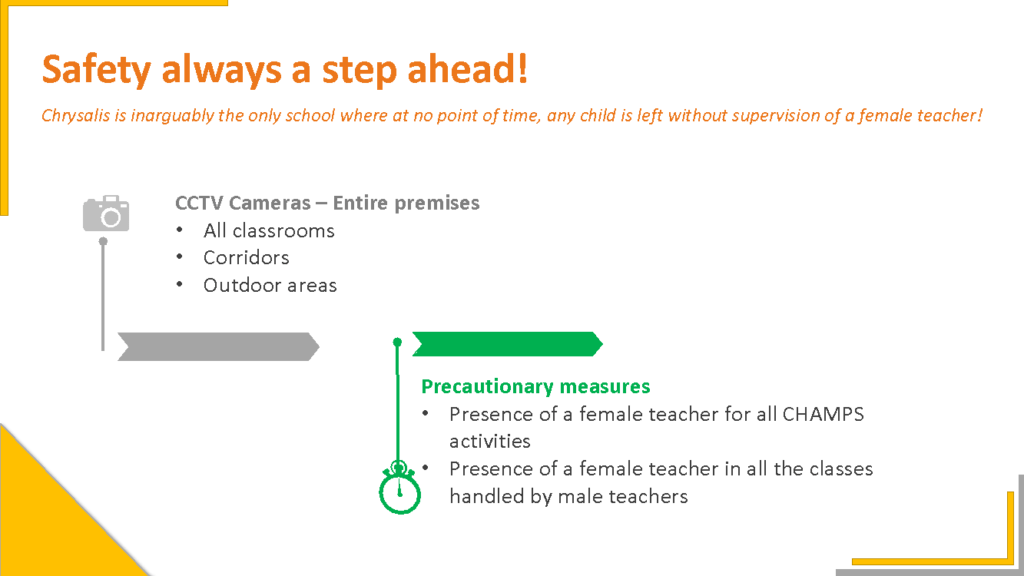“A Clean India Starts with Me and You”, this powerful message captures the spirit of the Bharat Abhiyan, which began as an initiative to make India more hygienic and cleaner and is now having a significant impact on schools. The leaders of tomorrow first learn that cleanliness is a lifelong habit that develops character, discipline, and accountability in classrooms, hallways and playgrounds. Schools figure prominently in the national movement to instill the habit of cleanliness because they promote values of cleanliness, order, and civic responsibility in the highly impressionable youth of our society. Children who are educated to value cleanliness become productive and responsible adults who are concerned about their home, community, environment, and health. The takeaway from these experiences is that students move from simply learning about cleanliness to truly understanding that maintaining clean environments is important not just for aesthetic appeal, but also for overall well-being and the development of a better nation.
What is Swachh Bharat Abhiyan?
The Clean India Mission, also called the Swachh Bharat Abhiyan, is a nationwide initiative that was started in 2014, to make India healthier, cleaner, and more hygienic than it is today. The goal mainly aims towards stopping open defecation, improve waste management, promote hygienic practices, and raise public awareness of the value of cleanliness. Moreover, beyond just maintaining physical cleanliness, this mission aims to create a culture in which hygiene is accepted as normal in India. Swachh Bharat has had a tremendous effect on education. Schools are now crucial allies in raising awareness and fostering positive habits in children. As educational institutions all over the nation implemented hygiene programs, installed sanitary facilities, and engaged students in activities that foster responsibility, phrases like Swachh Bharat and cleanliness mission became more common. Educational systems help students understand that keeping the area clean is not just the duty of employees or teachers, but also of themselves by tying the mission to student leadership and involvement.
Why Cleanliness Education Matters in Schools
Teaching cleanliness in our school, Chrysalis High is far more than just enforcing rules, it vastly shapes the personality and discipline of our students. When students learn to keep their surroundings clean, they build habits that stay with them throughout their lives.
Early cleanliness habits influence a child’s health, decision-making, social behaviour, and personality. They can also strengthen deep values such as respect, empathy, and self-control. Cleanliness education has moral, social, and practical importance. Morally, it encourages students to value their environment. Socially, it helps them become more aware of others’ needs and promotes teamwork. Practically, it helps reduce illnesses, improves attendance, and keeps the school environment safe and clean. These lessons help build a sense of community and civic responsibility, teaching students that keeping public spaces clean benefits everyone
How Schools are Contributing to Swachh Bharat
Many schools across India are taking proactive steps to advance the Swachh Bharat Mission. Many schools conduct cleanliness drives and competitions in which students clean classrooms, playgrounds, and school gardens, where cleanliness is not presented as a boring task, these drives help build cooperation among students and make cleanliness fun and engaging. Regular inspection of classroom hygiene also allows students to develop consistency and accountability in the cleanliness of their surroundings. Awareness creation campaigns led by students is another potent strategy. Students will create posters, perform street plays, or engage in public speaking to share information on hygiene and sanitation. Waste segregation and recycling efforts further develop students’ sense of environmental consciousness which can be done away from school grounds, making a bigger and more significant change. Clean campus days, wall art with motivational messages to promote cleanliness, and stratified monitoring by their peers all contribute to reinforcing the message.
Several schools have even published their champions and success stories, either by the teachers or through student-led initiatives in the school assembly, providing account of how engagement, championing and change in culture occurred by participating in competitions and engaging in cleanliness drives. When students see the impact of their involvement and contribution to Swachh, it helps further develop their motivation to be cleanliness ambassadors and make an impact.
Teaching clean habits from childhood can have several long-term advantages: Firstly, It builds personal discipline and responsibility. Secondly, It improves health and reduces absenteeism by preventing infections and diseases. Additionally, It promotes teamwork and social awareness through group activities. Moreover, It creates respect for public spaces and shared environments. Overall, It encourages sustainable living habits, such as recycling, reducing waste, and conserving resources. These habits contribute to the overall development of children, shaping them into responsible and thoughtful individuals.
Real-Life Examples or Success Stories
Multiple real-life examples that have taken place show us how schools have successfully implemented the Swachh Bharat Mission. Some schools participate in the Swachh Bharat School Awards, where they are evaluated based on cleanliness, hygiene facilities, waste management, and student involvement in these activities.
Winning schools share their experience to inspire others, creating awareness. Other schools have introduced eco-friendly initiatives such as compost pits, paper recycling units, or plastic-free campuses. Students take active roles in waste segregation and maintaining school gardens. The impact of these initiatives is visible: students become more aware, responsible, and motivated to contribute to a cleaner India.
How Parents and Teachers Can Reinforce the Habit
Cleanliness education becomes more effective and impactful when it extends beyond the classroom to homes and the social community. Parents play a major and lasting role by setting an example at home. Small steps such as, keeping surroundings clean, organizing belongings, and avoiding littering can play a vital role in creating a long-lasting habit for students. Encouraging children to maintain and clean their study space, help in small chores around the house, or to follow good hygiene helps reinforce the habits they learn in school. Teachers can further support this habit by integrating cleanliness into student’s daily routines. For example, conducting a quick classroom check, rewarding consistent cleanliness in classes, or including hygiene reminders in weekly or daily lessons. When parents and teachers work together, students receive a strong and consistent message. This helps reinforce the message, “Cleanliness is a core life skill, not just a duty.”
To conclude, the Swachh Bharat Mission helps remind the citizens of India that a clean environment leads to healthier lives, stronger communities, and a more responsible society. Schools play a powerful role in shaping the next generation to value cleanliness and work towards a cleaner India. Furthermore, by teaching children the importance of hygiene and involving them in the above meaningful activities, we as a team can help build a nation where cleanliness becomes a natural habit. Together, let’s inspire our future leaders to lead the Swachh Bharat movement in school and beyond the school environment as well. This can be achieved by one clean classroom at a time.
Written By – Rajeshwari R,
Academic Coordinator – Chrysalis High
FAQs
Students become cleanliness ambassadors by keeping classrooms, washrooms, and playgrounds clean and spreading awareness through school campaigns.
Yes. When children practice hygiene daily, these habits turn into lifelong behavior, shaping a cleaner and more responsible society.
A hygienic school reduces sickness, increases attendance, and helps students stay focused, improving overall learning outcomes.
Regular handwashing before eating and after using the restroom, as it prevents most common infections.
Chrysalis High engages students through interactive initiatives such as clean classroom competitions, community area cleaning drives, poster campaigns, and skits that promote hygiene, responsibility, and mindful behaviour.


